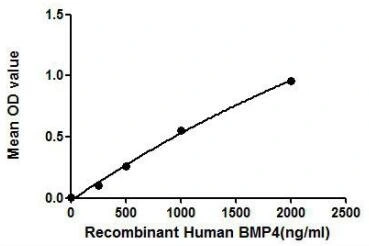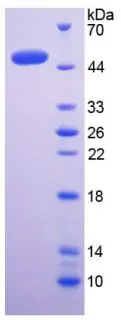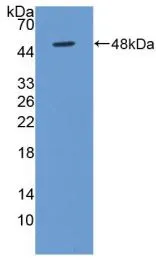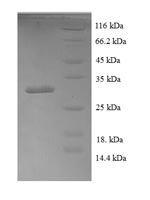
Functional ELISA analysis of GTX00079-pro Human BMP4 protein which can bind immobilized HJV protein.
Human BMP4 protein, His tag
GTX00079-PRO
ApplicationsFunctional Assay
Product group Proteins / Signaling Molecules
Protein IDP12644
Overview
- SupplierGeneTex
- Product NameHuman BMP4 protein, His tag
- Delivery Days Customer9
- Application Supplier NoteBMP4 (Bone morphogenetic protein 4) is a member of the bone morphogenetic protein family, which is involved in bone and cartilage development, specifically tooth and limb development and fracture repair. It has been proven that HJV (Hemojuvelin) acts as a coreceptor of BMPs, including BMP4; therefore, a binding ELISA assay was constructed to detect the association of recombinant human BMP4 with recombinant human HJV. Briefly, BMP4 were diluted serially in PBS, with 0.01% BSA (pH 7.4). Duplicate samples of 100 microl were then transferred to HJV-coated microtiter wells and incubated for 2h at 37C. Wells were washed with PBST and incubated for 1h with anti-BMP4 pAb, then aspirated and washed 3 times. After incubation with HRP labelled secondary antibody, wells were aspirated and washed 3 times. With the addition of substrate solution, wells were incubated 15-25 minutes at 37C. Finally, add 50 microl stop solution to the wells and read at 450nm immediately. The binding activity of BMP4 with HJV was in a dose dependent manner.
- ApplicationsFunctional Assay
- CertificationResearch Use Only
- ConjugateUnconjugated
- Gene ID652
- Target nameBMP4
- Target descriptionbone morphogenetic protein 4
- Target synonymsBMP2B, BMP2B1, MCOPS6, OFC11, ZYME, bone morphogenetic protein 4, bone morphogenetic protein 2B
- Protein IDP12644
- Protein NameBone morphogenetic protein 4
- Scientific DescriptionThis gene encodes a secreted ligand of the TGF-beta (transforming growth factor-beta) superfamily of proteins. Ligands of this family bind various TGF-beta receptors leading to recruitment and activation of SMAD family transcription factors that regulate gene expression. The encoded preproprotein is proteolytically processed to generate each subunit of the disulfide-linked homodimer. This protein regulates heart development and adipogenesis. Mutations in this gene are associated with orofacial cleft and microphthalmia in human patients. The encoded protein may also be involved in the pathology of multiple cardiovascular diseases and human cancers. [provided by RefSeq, Jul 2016]
- Storage Instruction-20°C or -80°C,2°C to 8°C
- UNSPSC41116120
- SpeciesHuman





